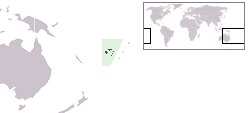| Revision as of 00:17, 23 December 2003 view sourceJiang (talk | contribs)43,437 editsmNo edit summary← Previous edit | Revision as of 11:17, 5 January 2004 view source Davidcannon (talk | contribs)Administrators99,571 editsm Cosmetic grammar correctionsNext edit → | ||
| Line 38: | Line 38: | ||
| ''Main article: ]'' | ''Main article: ]'' | ||
| Head of state of Fiji is the president, who is elected by the Great Council of Chiefs for a five-year term. The president appoints a prime minister and a cabinet from the House of Representatives, which has 71 seats. A number of seats of the parliament |
Head of state of Fiji is the president, who is elected by the Great Council of Chiefs for a five-year term. The president appoints a prime minister and a cabinet from the House of Representatives, which has 71 seats. A number of seats of the parliament are reserved for the major ethnic groups in Fiji, while the remainder are open. The upper chamber of the parliament, the Senate, has 34 seats, all of which are appointed. | ||
| == Divisions == | == Divisions == | ||
Revision as of 11:17, 5 January 2004
The Republic of the Fiji Islands occupies an archipelago in the South Pacific Ocean, east of Vanuatu, west of Tonga and south of Tuvalu.
| |||||
| National motto: Rerevaka na Kalou ka Doka na Tui (Fear God and honour the Queen) | |||||
 | |||||
| Official language | English | ||||
| Capital | Suva | ||||
| President | Ratu Iloilovatu | ||||
| Prime Minister | Laisenia Qarase | ||||
| Area - Total - % water | Ranked 151st 18,270 km² Negligible | ||||
| Population
- Density | Ranked 152nd
47/km² | ||||
| Independence | October 10, 1970 | ||||
| Currency | Dollar | ||||
| Time zone | UTC + 12 | ||||
| National anthem | God Bless Fiji | ||||
| Internet TLD | .FJ | ||||
| Calling Code | 679 | ||||
History
Main article: History of Fiji
The first inhabitants of Fiji arrived from South East Asia long before the islands were discovered by European explorers in the 17th century. It was not until the 19th century, however, that Europeans came to the islands to settle there permanently. The islands came under British control as a colony in 1874. It was granted independence in 1970. Democratic rule was interrupted by two military coups in 1987, caused by concern over a government perceived as dominated by the Indian community . A 1990 constitution favored native Melanesian control of Fiji, but led to heavy Indian emigration; the population loss resulted in economic difficulties, but ensured that Melanesians became the majority. Amendments enacted in 1997 made the constitution more equitable. Free and peaceful elections in 1999 resulted in a government led by an Indo-Fijian government, which was later deposed by a coup. Fiji has been a major contributor to UN peacekeeping missions in various parts of the world.
Politics
Main article: Politics of Fiji
Head of state of Fiji is the president, who is elected by the Great Council of Chiefs for a five-year term. The president appoints a prime minister and a cabinet from the House of Representatives, which has 71 seats. A number of seats of the parliament are reserved for the major ethnic groups in Fiji, while the remainder are open. The upper chamber of the parliament, the Senate, has 34 seats, all of which are appointed.
Divisions
Main article: Divisions of Fiji
Fiji is divided into four parts, called divisions:
- Central Division
- Northern Division
- Eastern Division
- Western Division.
The island of Rotuma, north of the main archipelago, has the status of dependency.
Geography
Main article: Geography of Fiji
File:Fj-map.gifFiji consists of 322 islands, of which about one third is inhabited. The two most important islands are Viti Levu and Vanua Levu. Viti Levu hosts the capital city of Suva, and is home to nearly three quarters of the population. The islands are mountainous, with peaks up to 1200 m, and covered with tropical forests. Other important towns include Savusavu and Lautoka.
Economy
Main article: Economy of Fiji
Fiji, endowed with forest, mineral, and fish resources, is one of the most developed of the Pacific island economies, though still with a large subsistence sector. Sugar exports and a growing tourist industry - with 300,000 to 400,000 tourists annually - are the major sources of foreign exchange. Sugar processing makes up one-third of industrial activity. Long-term problems include low investment and uncertain property rights. The political turmoil in Fiji has had a severe impact with the economy shrinking by 2.8% in 2000 and growing by only 1% in 2001. The Fiji Visitor's Bureau expects visitor arrivals to reach pre-coup levels during 2002. The government's ability to manage its budget - which is expected to run a net deficit of 6% in 2002 - will depend upon a return of political stability and investor confidence.
Demographics
Main article: Demographics of Fiji
Native Melanesian Fijians make up about half of the population of Fiji, while over 40% are descendants of Indian contract laborers brought to the islands by the British in the 19th century. The Fijians are mostly Christians, while the Indians are mainly Hindu or Muslim. The official language is English, but both ethnic groups speak their own languages, Fijian and Hindustani.
Culture
Main article: Culture of Fiji
See also: Music of Fiji
Miscellaneous topics
- List of Fijians
- Communications in Fiji
- Transportation in Fiji
- Military of Fiji
- Foreign relations of Fiji